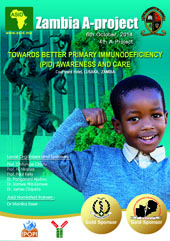Martine PERGENT, Vice President IPOPI, the International Patient Organisation for Primary Immunodeficiencies
Primary Immunodeficiencies (PID) are a group of genetic disorders caused when the immune system does not work properly. PIDs are life threatening conditions that lead to severe infections and high rate of mortality when not diagnosed and treated properly. Considering the prevalence of those conditions, around 600.000 people in Africa have their lives impacted by these chronic conditions. 99% remain undiagnosed and untreated.
The PID environment in the Africa is challenging and many factors hinder further progress including poor medical and healthcare infrastructure, low diagnosis rate, lack of awareness and medical expertise as well as financial and socio-economical issues. There are not many patients diagnosed and an added difficulty is to identify volunteers to engage into patients organisations.
IPOPI is the Association of national patient organisations dedicated to improving awareness, access to early diagnosis and optimal treatments for primary immunodeficiency patients worldwide through global collaboration. IPOPI is the leading advocate for primary immunodeficiencies patients worldwide in collaboration with patients, doctors –among them the African Society for ImmunoDeficiencies (ASID)-, politicians, regulators, pharmaceutical industry and many other stakeholders.
ASID and IPOPI work closely together to call upon African healthcare policy makers to join them in taking strong and decisive action to ensure that people with PIDs are diagnosed as early as possible and have appropriate access to safe, efficient life-saving treatments and optimum care.
A comparison with haemophilia
In spite of numerous challenges in Africa, rare diseases have been able to make significant advances in the region. Haemophilia gives a telling example of this. Haemophilia and PID are both genetic and rare conditions leading to severe health problems or death if not diagnosed and treated properly. For both conditions, treatments exist, mainly plasma derived products, listed in WHO essential medicines list. Even if PID prevalence is estimated at 1 in 2,000 (around 600,000 patients in the African continent), they remain not so well known and unrecognised whereas Heamophilia with a prevalence of 1 in 10,000 (around 120,000 patients) is well known since the 1970th. The number of diagnosed patients within the continent in 2015 for those two conditions highlights the improvements that are needed: 2,500 patients with PID and 50,000 patients with haemophilia. The table below outlines some key differences but also common challenges.

The haemophilia patient community provides an excellent example of successful advocacy work and building awareness. It has succeeded in achieving good diagnostic and treatment levels through organised efforts in Africa. When it comes to PIDs, despite a better level of awareness in a few African countries, in most countries efforts to raise PID awareness have only recently started with slowly increasing diagnosis rates. Given the similarities of the two conditions and the positive experience of the haemophilia community in the continent, there is a lot of potential in Africa to improve PID care and launch national PID patient organisations. This example and the growing interest into rare diseases in Africa indicates that the PID environment is set to significantly improve in the coming years
Why a Patient organisation?
Coming to national patient organisations, IPOPI has supported the work and helped launch new patient organisations in collaboration with different stakeholders in Africa in recent years. Despite these successful collaborations, to date IPOPI has only five national member organisations in Africa. Among them, Hajar, the Moroccan Patient organisation which thanks to the huge efforts driven by the medical community has achieved great progress for the benefit of patients over the last twenty years (See box below). But in Morocco, as is many other African countries, much remains to be done!
| The Moroccan example: Hajar Achievements Hajar has driven its actions in different fields: • developing care, advice and psychological support, • obtaining equipment (purchase of a Cytometer for the accurate diagnosis of PIDs at hospital), • funding the development of the Clinical Immunology Unit, the Immunoglobulin Infusion Room, • funding the purchase of almost 80% (for 15 years) and then 50% of the drugs, mainly immunoglobulins, and paraclinic explorations, • creating ASID, the African society for Immuno Deficiencies, launching ASID schools, • training paediatricians and biologists especially in West Africa and enabling the establishment of bridges with Maghrebian, then African and Arab specialists, • raising awareness in translating into Arabic and disseminating IPOPI educational leaflets. |
A national patient organisation is key to support patients, especially those with rare diseases, collaborate with physicians and other stakeholder to raise awareness, develop patient therapeutic education, improve care and treatment, and advocate among health decision makers to improve diagnosis and access to treatment. Because of the obvious challenges patients face, they have demonstrated their role in many countries, including developing countries, in Africa and other continents.
How to tackle the plight of undiagnosed PID patients?
With appropriate treatment, PID patients will be able to lead normal and productive lives. Improved diagnosis of PIDs and provision of optimal treatments will have a positive impact on healthcare budgets.
IPOPI brought together PID experts so as to provide an appropriate framework for the care of PID patients. It consists in five principles of care (see reference blow) that should be considered by national Health authorities for their policies and for encouraging international cooperation where economies of scale are relevant.
1. Early diagnosis:
• Support should be made available to African healthcare providers to facilitate the early diagnosis of PIDs thereby preventing complications, repeated hospitalisations and decreasing mortality rates.
• Provision of basic PID blood tests should be made available as a first step. PID genetic diagnostics should be further developed and made accessible across the region as a second step. Newborn screening should be considered for severe PIDs such as Severe Combined Immunodeficiency (SCID) as a disease prevention programme.
2. Treatment:
• Immunoglobulin (IG) replacement therapies -which are recognized as essential medicines both for children and for adults by the World Health Organisation (WHO)- Antibiotic, anti-fungal prophylaxis are key in preventing infections in those conditions. Platforms for Hematopoietic stem cell transplantation should be made available to PID patients and prioritised in healthcare budgets across Africa.
• Strategies should be envisaged to ensure an optimal supply of these life-saving therapies.
3. Education
• Educational efforts should be put into place to increase the expertise on PIDs in the African continent, with the inclusion of PIDs in the MD curriculum as an emerging and increasingly important field of clinical medicine.
• Continuing medical education should also be required for physicians practicing in primary care settings and hospitals.
4. PID Registries
• National PID registries should be implemented in all African countries, in cooperation with the international registry. National registries are important tools for assessing the prevalence as well as the incidence of PIDs, detecting areas of low diagnosis rates and providing data to support research in the field. It also provides valuable information to governments to aid planning of educational programmes and allocation of treatments for patients in need.
5. Specialized Treatment Centres
• National or regional specialized treatment centers should be implemented to enable equitable geographical access for patients to medical and nursing expertise in these diseases.
Managing diagnosis and care of PIDs is still in its infancy in most parts of Africa. The needs are huge in the region, however some countries, even with very little means, have demonstrated that the situation for some rare diseases can be significantly improved when stakeholders cooperate. Why shouldn’t PIDs follow this path too?
Sources
- Bousfiha, A. A., Jeddane, L., Ailal, F., Benhsaien, I., Mahlaoui, N., Casanova, J. L., & Abel, L. (2013). Primary immunodeficiency diseases worldwide: more common than generally thought. Journal of clinical immunology, 33 (1), 1-7.
- Bousfiha, A. A., Jeddane, L., Erwa, N., Dieye, T. N., Mellouli, F., Reda, S. M., & Boukari, R. (2015). Development of Primary Immunodeficiencies in Africa. Journal of clinical immunology, 35 (4), 329.
- Chapel, H., Prevot, J., Gaspar, H. B., Español, T., Bonilla, F. A., Solis, L., & Drabwell, J. (2014). Primary immune deficiencies–principles of care. Frontiers in immunology, 5, 627.
- IPOPI NMO Survey from 2014.
- Skinner, M. W. (2010). Building our global family–achieving treatment for all. Haemophilia, 16 (s5), 1-10.
- The Specialist Forum (2015). Haemophilia care in Africa. Published on May 26 2015 in Journals.



























